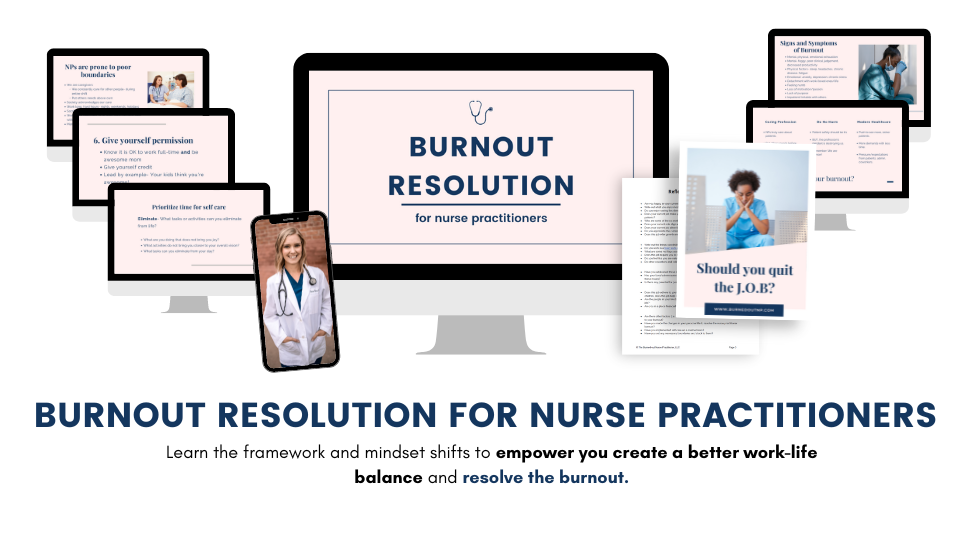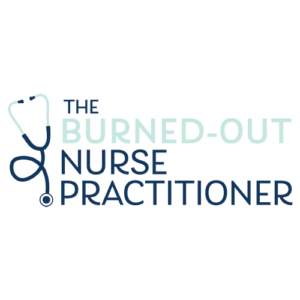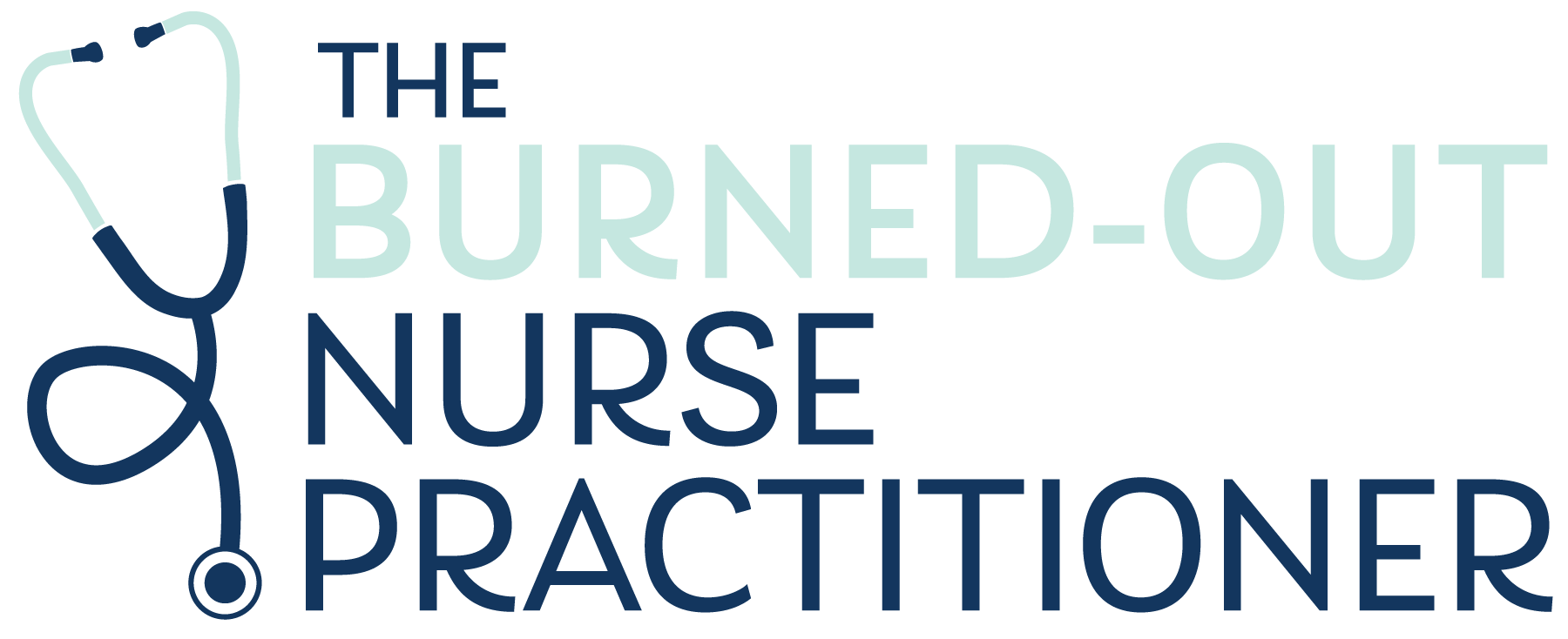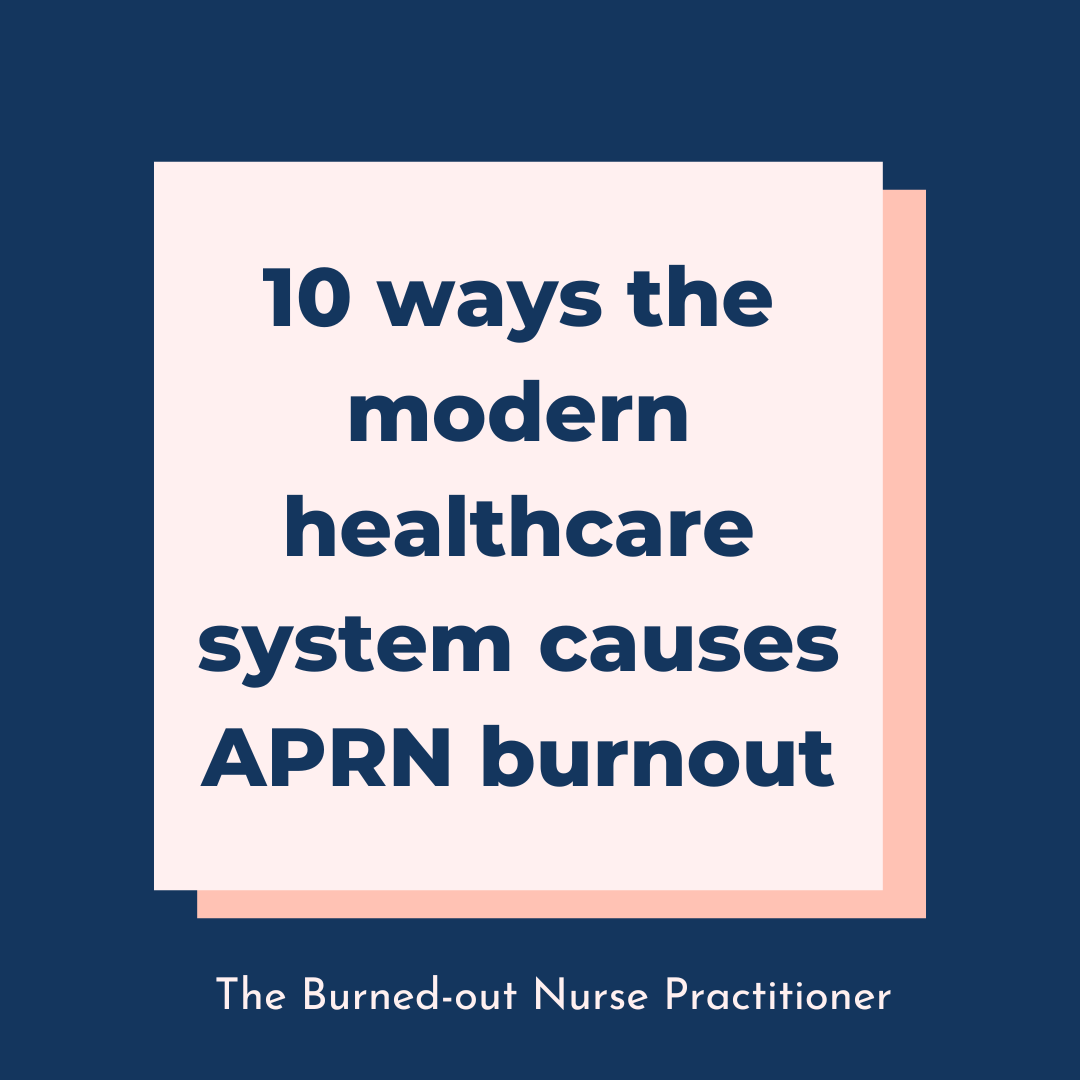The modern healthcare system is slowly destroying nurse practitioner’s passion and fulfillment in our careers. The modern healthcare system is creating a disproportionate work-life balance and generating nurse practitioner burnout rates at an all time high.
Nurse practitioners were burned-out before the COVID-19 pandemic, but the past three years have brought tremendous challenges and hardships for healthcare providers. The modern healthcare system’s flaws have surfaced and healthcare providers, support staff, and even patients are realizing the defects.
As The Burned-out Nurse Practitioner, I have talked with so many APRNs who have reached the breaking point of nurse practitioner burnout.
These nurse practitioners:
- Are mentally, physically, emotionally exhausted
- Have lost their passion and fulfillment in healthcare
- Experience a lack of work-life balance
- No longer demonstrate empathy and compassion for patients Have personal relationships that are suffering
The modern healthcare system
There are many factors within the modern healthcare system that contribute to nurse practitioner burnout. These factors, along with the natural tenancies and roles as nurses, cause nurse practitioners to be prone to burnout. Becoming aware of these negative elements and defects in the modern healthcare system can help APRNs overcome nurse practitioner burnout.
Increased patient load.
The modern healthcare system is all about the numbers. There is a push from administration to see more patients, sicker patients in a less amount of time. Patients are scheduled for 15 minute appointments and often double booked. It is very difficult to assess, diagnose, and treat a patient in 15 minute appointments.
Both the patient and provider feels rushed which creates a lack of education, compliance, and proper treatment. This increased workload within the modern healthcare system can lead to chronic stress and exhaustion, contributing to nurse practitioner burnout.
Staffing challenges.
Many industries across the world have experienced extreme staffing shortages and healthcare is no different. One of the reasons healthcare is so short staffed is because of healthcare burnout.
So many healthcare providers have left the field altogether because of the challenging demands of the job. So many healthcare providers knew their own mental, physical, emotional health was more important than a J.O.B. The modern healthcare system leaders should realize the amount of providers that have left and address the situation.
Tightening insurance regulations.
I have shared my own frustrations with the modern healthcare system when dealing with prior authorizations. Read about 11 tips to improve the prior auth process as NPs. And I know many other nurse practitioners feel the same about the tightening insurance regulations.
It is frustrating to want to provide quality care of your patient but then have to get insurance approval to complete necessary tests or prescribe certain medications. The modern healthcare system defects make it difficult to care for the patient.
Emotional demands.
Providing healthcare services can be emotionally challenging, as nurse practitioners frequently encounter patients who are in pain, suffering, or distress. We deal with a lot of challenging situations and experience hardships with our patients.
Many nurse practitioners experience second victim syndrome or have their own traumatic experiences that they never process. Constant exposure to these emotional demands can lead to emotional exhaustion and compassion fatigue, contributing to nurse practitioner burnout.
While the modern healthcare system does not directly impact our own emotional demands, the downfall is the lack of resources available. There are some companies providing burnout webinars and informational sessions. But APRNs need personalized support to help them overcome nurse practitioner burnout.
That is why we offer coaching through The Burned-out Nurse Practitioner. To help overwhelmed NPs create a better work-life balance and overcome nurse practitioner burnout.
Lack of work-life balance.
The demanding nature of the modern healthcare system can make it difficult for nurse practitioners to achieve a healthy work-life balance. Long hours, irregular schedules, and high levels of stress can interfere with personal relationships, hobbies, and self-care.
These nurse practitioner career demands can ultimately lead to nurse practitioner burnout. The demands of working as a nurse practitioner create a lack of work-life balance. Even when we do have a day off, many nurse practitioners still struggle with thinking/stressing about work.

Job related demands.
The modern healthcare system jobs often have additional requirements that can ultimately cause nurse practitioner burnout. Many APRN jobs require the nurse practitioner to take call on nights, weekends, and holidays. Oftentimes this call time is in addition to a 40+ hour jam packed work week. In a lot of cases, the call time is unreasonably compensated or not paid for at all.
These additional work hours cause additional stress and overwhelm. It makes it difficult to have time to implement self-care. To rest and recharge before the next workday. To spend time with our families/friends. To get a full night sleep so we can be energized the next day. To create a better work-life balance and overcome nurse practitioner burnout. The modern healthcare system placed these additional job related demands that are negatively impacting nurse practitioners.
Charting demands.
The #1 cause of lack of work-life balance as a nurse practitioner is CHARTING! So many APRNs are staying late at the office or bringing charts home just trying to stay caught up. Not only do nurse practitioners assess, diagnose, and treat patients, we also have to document our findings. Then add on the medication refills, reviewing past medical documentation, analyzing diagnostic data, and the never ending patient messages.
Nurse practitioners are increasingly responsible for administrative tasks that take time away from direct patient care, create a lack of work-life balance, and cause nurse practitioner burnout.
Limited autonomy.
Despite their advanced training and expertise, nurse practitioners often face limitations on their scope of practice due to legal and regulatory restrictions within the modern healthcare system. Many nurse practitioners experience this limited autonomy from other healthcare providers who do not believe nurse practitioners play a vital role in the modern healthcare system.
Patients may also express negative thoughts or feelings towards nurse practitioners. Some prefer to see a physician or think the nurse practitioner does not know even to coordinate patient care. This lack of autonomy and negative feelings can be frustrating and demoralizing, leading to nurse practitioner burnout.
Inadequate resources.
Many healthcare systems fail to provide nurse practitioners with the necessary resources and support, such as appropriate staffing levels, technology, and professional development opportunities. Without these resources, nurse practitioners may struggle to provide high-quality care, which can contribute to nurse practitioner burnout.
Inadequate support systems.
The modern healthcare system often fails to provide sufficient support systems for nurse practitioners. This includes limited access to mentorship, counseling services, or peer support groups. This lack of transparency and support can negatively impact their ability to cope with the challenges. Many nurse practitioners feel alone with their challenges and frustrations. These feelings of loneliness can contribute to nurse practitioner burnout.
Make sure to join The Burned-out Nurse Practitioner’s Facebook Group. The group is full of equally burned-out nurse practitioners ready to support one another!
Additional resources for nurse practitioner burnout
The modern healthcare system creates many challenges and predisposes nurse practitioners to a lack of work-life balance and ultimately nurse practitioner burnout.
This is why I created The Burned-out Nurse Practitioner. Single handed, I am not able to change the modern healthcare system. But I am able to be a voice and resource for burned-out nurse practitioners. I have put together a variety of resources to help APRNs overcome nurse practitioner burnout.
Here are a few resources offered by The Burned-out Nurse Practitioner.
- Burnout Resolution for Nurse Practitioners teaches NPs the framework and mindset shifts to empower you create a better work-life balance and resolve the burnout.
- Coaching Session with a Burnout Resolution Coach gives NPs personalized support on topics ranging from overcoming nurse practitioner burnout to determining if you should quit the J.O.B. that is burning you out, to everything in between.
- The Burned-out Nurse Practitioner’s blog page offers tips and tricks for creating a better work-life balance and overcoming nurse practitioner burnout.
- The Nurse Practitioner Charting School is the one-stop for all documentation resources created specifically for nurse practitioners.
Don’t forget to join The Burned-out Nurse Practitioner’s Facebook Group. The group is full of equally burned-out nurse practitioners ready to support one another!

For time management and charting tips, check out The Nurse Practitioner Charting School– The one stop for all documentation resources created specifically for nurse practitioners. Learn more at www.npchartingschool.com

**Full disclosure, this blog post may include affiliate links. I do receive a commission if any of the affiliate programs/services/supplies are purchased. This is at no extra cost to you but does allow me to continue to provide content as The Burned-out Nurse Practitioner! Thank you!




